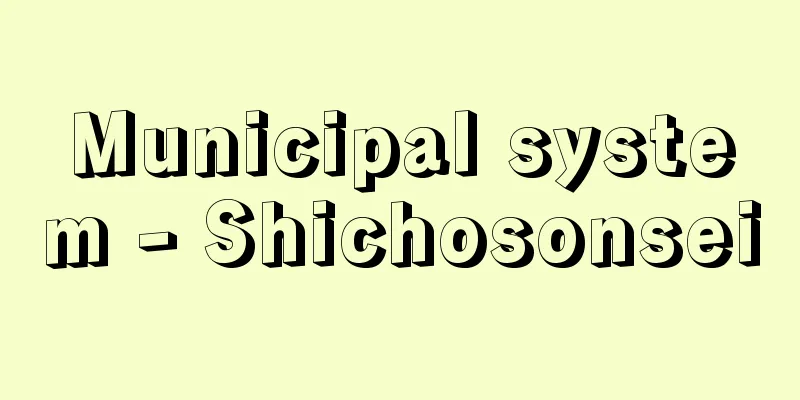Leisure - Leisure (English spelling)

|
It is translated as leisure. It comes from the Latin licēre, which means "allowed." When considered as "time," leisure refers to free time in daily life, but when considered as "activity," it means activities that use this free time in a human way. Its origin is the Greek word scholé. First, scholé means extra time or simply time. Second, it means to learn. The English word school comes from scholé. scholé means the time that humans have, especially free time, but also the aspect of human mental activity, that is, learning in a broad sense (life learning) that takes place during this time. Leisure is the time that free humans can use freely to develop and advance their humanity, and the activities that take place during that time. [Akira Fujitake] Leisure and time consciousnessModern leisure was born from the development of consciousness about time. In modern times, consciousness about time has permeated every corner of social life, and rationality, efficiency, and productivity have become important social values, so human time has come to be precisely determined by clock time. Modern society is based on the idea that it is ideal to use time efficiently. These values also give social importance to labor and production, and have created the idea that it is labor or work that humans find meaning in life. However, in modern times, people are beginning to have doubts about thinking about life through this consciousness of time centered on labor and production. This is due to the growth of a sense of living life in one's own way, which is also related to the fact that society has come to show a strong aspect of a consumer society. The development of capitalist society was supported by the development of machines (technology) based on the clock, and furthermore, by the improvement of productivity through scientific management, it paved the way for the realization of an affluent society based on mass production and mass consumption. This created a way of thinking that placed work at the center of life, and in reality, it established a social system in which work time occupies an important part of people's time allocation and daily life unfolds with work time as the basic axis. These work-centered values fostered a sense of regularity in time, or punctuality, throughout society. Social activities are dominated by the feeling that order can only be achieved by each individual's actions being on time and without error. With the spread of clocks, the sense of regularity in time, on the one hand, and the habit of dividing time and using it efficiently, on the other hand, became more widespread in society. This is the establishment of the idea of saving time. Thus, the idea of leisure activities based on the idea of saving time was established in society. However, as people became more affluent and the sense of convenience and comfort in consumer life became more widespread, people gradually began to realize the need for a life with leisure, and even began to think of leisure with leisure in a context different from the time consciousness centered on work and production. This is the establishment of the value of living with leisure. [Akira Fujitake] Shorter working hours and leisureThe modern concept of leisure was established at the first ILO (International Labor Organization) General Conference in 1919, when the first ILO Convention, "Limiting the Hours of Work in Industrial Undertakings to Eight Hours a Day and Forty-Eight Hours a Week," was adopted, establishing the principle of the eight-hour work day internationally and incorporating it into the global labor movement. Modern leisure was first positioned within the time people live, in contrast to working hours. The relationship that has been established is that as working hours are reduced, leisure time increases accordingly. Looking at the ILO's subsequent developments regarding leisure, in 1921, the "Convention concerning the Application of the Weekly Holiday in Industrial Undertakings" was established as Convention No. 14, which established "one holiday of at least 24 consecutive hours in every seven-day period," i.e., one holiday per week. At the ILO's 6th General Conference in 1924, the "Recommendation concerning the Development of Facilities for the Employee's Leisure Time" was issued. In 1930, the principle of an eight-hour workday was established for commercial and clerical work as well as Convention No. 30, and in 1935, the "Convention concerning the Reduction of the Hours of Work to 40 Hours a Week" was adopted as Convention No. 47. It is important to note that leisure was already strongly considered internationally in the 1910s from the perspective of reducing daily working hours, and in the 1920s, by considering human working hours in weekly units and securing one day of holiday per week. [Akira Fujitake] Japanese people's leisure consciousness and the establishment of a two-day work weekIn Japan, the principle of eight hours a day and 48 hours a week was institutionally established with the enactment of the Labor Standards Act in 1947 (Showa 22). In fact, the idea of leisure only began to take hold after the start of the period of high economic growth. In the workplace, the advancement of automation brought about major changes in the form of work, and as society became more affluent, consumption styles changed from the satisfaction of basic, material needs to the satisfaction of derivative needs tailored to each individual's tastes. At home, the remarkable spread of durable consumer goods in particular led to the rationalization of housework and a reduction in the burden of housework. The rapid economic growth of Japanese society brought about a shift in all areas of society from work-centered values to values that emphasize consumption and entertainment. Furthermore, it is important to note that the spread of television and other audiovisual media expanded the scope of people's vicarious experiences. In this way, economic prosperity and the advancement of information society have permeated Japanese society as a homogenous urban lifestyle, and have made Japanese people conscious of a life of material and even spiritual comfort. As the Japanese way of satisfying needs shifts from a basic to a derivative stage, the pleasure principle that emphasizes enjoying life becomes established in society. In Japan, the two-day weekend system began to be adopted in the 1980s, and in May 1992, national civil servants were given the two-day weekend system, and in 2002, public schools were also given the two-day weekend system. The 1985 amendment to the National Holidays Act (National Holidays Act) and the 2005 amendment led to the establishment of a long Golden Week holiday, and leisure time has become institutionalized in the lives of Japanese people. In addition, the 2003 amendment made Respect for the Aged Day a target for Happy Monday, creating a long autumn holiday (Silver Week) along with the Autumnal Equinox Day, and there is also a movement to create a long holiday centered around Culture Day. [Akira Fujitake] Leisure and lifeLeisure is an important aspect of life for modern people as time and activity for self-realization, and it has come to be recognized that the meaning it has for humans varies depending on the time space in which it takes place, such as weekdays, weekends, and holidays, and the length of time available. Humans can design their own unique lives by skillfully positioning these time spaces in their lives. Time passes by every second, but humans can save time depending on how they spend it. For example, think about the results you can achieve in 10 years by dedicating 30 minutes a day to calligraphy practice. The relationship between humans and leisure varies depending on the nature of time and space, such as everyday weekday leisure, weekend leisure, summer and winter holidays, etc. The meaning also differs depending on the stage of a person's life cycle. For example, the meaning of time is different for young people and for the elderly. Leisure is not simply spending free time according to each person's preferences, but is an act of asking oneself how to live one's life through it. By positioning leisure effectively in one's life, humans can save time and design their own unique lives. [Akira Fujitake] The emergence of a leisure-oriented societyThe Japanese consciousness is steadily shifting towards a more leisure-oriented approach. Furthermore, the desire for more leisure in life and the movement to seek true wealth are making people realize the importance of leisure in life. Japanese people have begun to place importance on leisure, such as hobbies, entertainment and even learning activities, in their daily lives. People's leisure activities are closely related to economic trends, and the performance of the leisure industry also tends to be influenced by the economy, but people's desire to engage in leisure activities is growing, and although the amount of money spent on leisure varies depending on economic trends, leisure activities are becoming more diverse and active. One area of leisure activities that is steadily growing is the desire for lifelong learning. The desire to learn, including hobbies, is steadily growing. The need for lifelong learning is being incorporated into the life planning of the Japanese people. Travel remains a very popular activity, with the number of people traveling abroad increasing year by year. Attitudes towards travel are also changing, with a growing need for longer stays. This has also increased the popularity of resort-based leisure activities. There is also an increasing interest in nature and health, with an increasing number of people enjoying leisure activities that involve being close to nature, such as sports and camping. Car camping is also becoming more popular as leisure facilities are being developed in various regions and the car-oriented society progresses, which has been linked to a nature- and health-oriented social psychology. These circumstances have created an environment in which the Japanese people place importance on leisure in their lives. However, the institutional foundations that support leisure still lag behind, and the rate and number of paid holidays taken are far behind those in developed Western countries. Despite these limitations, the spread of the leisure mindset is giving Japanese people an opportunity to ask themselves what life is and what they should do to live a rich life. It is steadily nurturing a desire not just to play but to learn in order to enrich themselves spiritually. [Akira Fujitake] "Play and Man" by R. Caillois, translated by Shimizu Ikutaro et al. (1970, Iwanami Shoten) ▽ "Sociology of Leisure" by J. Dumazdier, supervised translation by Juri Shigeru (1981, Shakaishisosha) ▽ "The Social Psychology of Leisure" by Roger C. Munnell and Douglas A. Cleaver, translated by Hayami Toshihiko (2004, Sekaishisosha) ▽ "Japanese Time Use in 2010 - NHK National Time Use Survey" edited by NHK Broadcasting Culture Research Institute (2011, NHK Publishing) ▽ "Leisure White Paper 2012" edited and published by Japan Productivity Center (2012) [References] | | | | | | | | |Source: Shogakukan Encyclopedia Nipponica About Encyclopedia Nipponica Information | Legend |
|
余暇と訳す。「許される」意のラテン語licēreに由来する。レジャーは、「時間」としてとらえると、生活時間のなかでの自由時間をいうが、さらに「活動」としてとらえると、この自由時間を人間的に使う活動を意味する。その語源はギリシア語のスコーレscholéである。スコーレは、第一に、余分な時間あるいは単に時間をさす。第二に、それは学ぶことを意味する。英語のスクール(学校)はスコーレから発している。スコーレは、人間がもっている時間、とくに自由時間を意味するとともに、この時間において行われる広い意味での学習(人生学習)という、人間の精神的な活動の側面をも意味していた。レジャーは、自由な人間が、自己の人間性を開発し、発展させるために、自由に使用できる時間であり、かつその時間において行われる活動のことである。 [藤竹 暁] レジャーと時間意識現代人のレジャーは、時間についての意識が発達したことによって生まれた。現代では、時間意識は社会生活の隅々にまで浸透しており、合理性、能率と効率、そして生産性が重要な社会的価値となってきたために、人間的時間は時計時間によって、正確に定められることになった。現代社会は、時間をむだなく使用することを理想とする考え方を基礎としている。こうした価値観は、また、労働と生産に社会的な重要性を与え、人間が生きていることの意味をみいだすのは労働ないしは仕事にあるという考え方を生み出した。しかし現代では、こうした労働と生産を中心とする時間意識によって人生を考えることに対して、人々は疑いの気持ちを抱くようになっている。自分らしく人生を過ごすという感覚の成長であり、それはまた社会が消費社会としての側面を色濃く示すようになったこととも関係している。 資本主義社会の展開は、時計を原型とする機械(テクノロジー)の発達に支えられ、さらに科学的管理法による生産性の向上によって、大量生産と大量消費のもとに、豊かな社会実現の道を歩んだ。それは、労働を生活の中心に据える考え方をつくりだし、現実には、労働時間が人間の生活時間配分のなかで重要部分を占め、労働時間を基本軸として日常生活が展開する社会システムを確立した。 こうした労働中心の価値観は、社会全体に時間的な規則正しさの感覚、つまりパンクチュアリティ(時間厳守)の感覚を育てた。社会の活動は、それぞれの人間が時間どおりに狂いなく行動することによって、初めて秩序を獲得することができるという感覚の支配である。時計の普及によって、一方では時間的な規則正しさの感覚が、他方では時間を分割し、時間を効率よく活用する習慣が、よりいっそう社会に浸透した。時間節約観念の成立である。こうしてレジャーについての考え方は、まず時間節約観念を基礎にしたレジャー活動の考え方を社会に定着させた。しかし生活が豊かになり、消費生活における便利さ、快適さについての感覚が浸透するにつれて、人々はしだいに、ゆとりのある生活が必要であることに気づくようになり、労働と生産を軸にした時間意識とは別の文脈で、ゆとりのあるレジャーを考えるようになってさえいる。ゆとりをもって生きるという価値観の成立である。 [藤竹 暁] 労働時間短縮とレジャー現代におけるレジャーの考え方は、1919年のILO(国際労働機関)第1回総会で、ILO第1号条約として「工業的企業における労働時間を1日8時間かつ1週48時間に制限する条約」が採択され、8時間労働制の原則が国際的に確立して、世界的な労働運動のなかに組み込まれた。現代におけるレジャーは、まず、労働時間と対比されて、人間の生活時間のなかに位置づけられた。労働時間が短縮されると、それだけレジャー時間が増大するという関係の成立である。 レジャーに関するその後のILOの動きを概観すると、1921年には、第14号条約として「工業的企業における週休の適用に関する条約」が定められ、「7日の期間ごとに1回少なくとも継続24時間の休暇」、すなわち週に1回の休日制度が確立した。1924年のILO第6回総会では、「労働者の余暇利用施設の発達に関する勧告」が出された。1930年には、ILO第30号条約として、商業および事務労働についても8時間労働制の原則が定められ、1935年には、第47号条約として「労働時間を1週40時間に短縮することに関する条約」が採択された。国際的には、すでに1910年代において、1日の労働時間の短縮という観点から、そして1920年代においては、人間の労働時間を1週間単位でとらえ、1週間に1日の休日を確保することで、レジャーが強く意識されていた点が重要である。 [藤竹 暁] 日本人のレジャー意識と週休2日制の定着日本において、1日8時間、1週48時間の労働原則が制度的に確立したのは、1947年(昭和22)の労働基準法制定によってであった。実際にレジャーの意識が浸透し始めたのは、高度成長期を迎えてからである。職場においては、オートメーション化の進行によって、労働の形態が大きく変化し、さらに社会は豊かになり、基礎的で物質的な欲求充足から、派生的で各人の好みにあった欲求充足へと、消費のスタイルが変化した。家庭においては、とくに耐久消費財の目覚ましい普及によって、家事が合理化され、家事労働の負担が軽減された。 日本社会の高度成長は、社会のすべての領域において、労働中心の価値観から消費と娯楽を重視する価値観への変化を生み出した。さらにテレビをはじめ視聴覚メディアの普及が、人々の代理体験の領域を拡大した点も見逃せない。こうして経済的豊かさと社会の情報化の進展は、日本社会全体に均質的な都市的生活様式を浸透させるとともに、日本人に物質的に、さらには精神的にゆとりのある生活を意識させるようになった。 日本人の欲求充足のスタイルが、基礎的な段階から派生的な段階へと移行することによって、生活を楽しむことを重視する快楽原則が社会に定着することになる。日本では1980年代に入って完全週休2日制が採用され始め、1992年(平成4)5月からは国家公務員の完全週休2日制が実施され、2002年度(平成14)からは公立学校の完全週休2日制も実施されるようになった。また1985年の「国民の祝日に関する法律(祝日法)」の改正、さらに2005年の改正によって、いわゆるゴールデンウィークの大型連休化が進行するなど、日本人の生活のなかに余暇が制度化されるようになっている。また2003年の改正では敬老の日がハッピーマンデー対象となったことで、秋分の日とあわせて秋にも大型連休(シルバーウィーク)が生まれることとなり、さらに文化の日を中心にして大型連休をつくる動きもある。 [藤竹 暁] レジャーと人生レジャーは、自己実現の時間および活動として、現代人にとって重要な人生の側面であり、それが行われる時間的空間である平日、週末、休暇など、時間的ゆとりの長さによって、人間に対してもつ意味が異なることが認識されるようになった。人間は、これらの時間的空間を生活のなかにうまく位置づけることによって、その人間に独自の人生をデザインすることができる。時間は刻々と過ぎ去ってゆくが、その過ごし方いかんでは、人間は時間を貯蓄することができるからである。たとえば、1日に30分、かならず書道の稽古(けいこ)にあてる毎日を過ごすことで、10年後に得られる成果を考えればよい。 平日の日常的レジャー、週末のレジャー、夏・冬の休暇など、その時間的空間の性質によって、人間とレジャーの関係は異なってくる。また、人間がライフ・サイクルのどの段階にいるかによっても、意味が異なる。たとえば、若者のレジャーと高齢者のレジャーとでは、時間の意味が違う。レジャーはただ単に自由な時間を各人の好みにあわせて過ごすだけではなくて、そのことを通して、人生をいかに生きるかを自分自身に問う行為である。人間はレジャーを生活のなかでうまく位置づけることで、時間を貯蓄できるとともに、自分独自の人生を設計できる。 [藤竹 暁] レジャー重視型社会の成立日本人の意識は着実にレジャー重視型へと動いている。また生活にゆとりを求める感覚や本当の豊かさを模索する動きが、人生におけるレジャーの重要性を気づかせている。日本人は日常生活のなかで、趣味や娯楽さらには学習活動などのレジャーを重視するようになった。人々のレジャー活動は景気の動向と密接に関係しており、レジャー業界の業績も景気に左右される傾向をもっているが、レジャー活動への人々の意欲は強くなっており、景気の動向によってレジャーに投下する金額は変動するものの、レジャー活動はますます多様化し、活発になっている。 レジャー活動のなかで地道に増大している領域は、生涯学習への意欲である。趣味をはじめ、学習への欲求は着実に育っている。生涯学習に対するニーズは、日本人の人生設計に組み込まれつつある。 依然として人気の高い活動は旅行で、海外旅行者数は年々増加している。旅行に対する感覚も変化しており、滞在型へのニーズが増加している。それはまた、リゾート型レジャー活動の人気を高めている。自然・健康志向も増加しており、スポーツやキャンプなど自然に親しみながらレジャーを楽しむ人口が増大している。オートキャンプが人気を集めているのも、各地のレジャー関連施設が整備され、車社会化が進展し、それが自然・健康志向の社会心理と結び付いたからである。 こうした状況は、日本人の生活のなかでレジャーを重視する意識を育てる土壌となっている。しかしレジャーを支える制度的基盤にはまだ遅れが目だっており、有給休暇取得率、取得日数でも欧米先進諸国には遠く及ばない。このような制約はあるものの、レジャー意識の浸透は日本人に対して人生とは何か、豊かに生きるためには何をなすべきかを自問自答する機会を与えている。ただ遊ぶだけではなく、自分自身を精神的に豊かにするために学びたいという欲求を着実に育てている。 [藤竹 暁] 『R・カイヨワ著、清水幾太郎他訳『遊びと人間』(1970・岩波書店)』▽『J・デュマズディエ著、寿里茂監訳『レジャー社会学』(1981・社会思想社)』▽『ロジャー・C・マンネル、ダグラス・A・クリーバー著、速水敏彦訳『レジャーの社会心理学』(2004・世界思想社)』▽『NHK放送文化研究所編『日本人の生活時間・2010――NHK国民生活時間調査』(2011・NHK出版)』▽『日本生産性本部編・刊『レジャー白書 2012』(2012)』 [参照項目] | | | | | | | | |出典 小学館 日本大百科全書(ニッポニカ)日本大百科全書(ニッポニカ)について 情報 | 凡例 |
>>: Leśmian (English spelling)
Recommend
Ornithogalum - Ornithogalum
A genus in the Liliaceae family (APG classificati...
Senri Hills
A hilly area in the northern part of the Osaka Pl...
Oates - Joyce Carol Oates
An American female writer. Born in Lockport, New ...
United Press Association
…Before and after World War II, the three major n...
Syrup - syrup (English spelling)
A general term for thick, sweet liquids. It is ma...
Alkaline manganese storage battery - Alkaline manganese storage battery
...Silver oxide-zinc batteries were first develop...
Easy Order
...After Japan was defeated in the war, people ca...
Charles Du Bos
1882‐1939 French critic. Born into an upper-class ...
Tectaria macrodonta (English spelling) Tectariamacrodonta
…[Shigeyuki Mitsuda]. … *Some of the terminology ...
Period drama movie
Japanese feature films are broadly divided into mo...
Inozaki Ritsusai
…However, by the time of Enyo (?-1758), there had...
Monterey (English spelling)
A city in California, United States. It is located...
Foreign Service Civil Service Recruitment Intermediate Examination - Gaimukomuinsaiyouchukyuushiken
...However, in the United States, the tradition o...
Amanyu - Amanyu
A large perennial herb of the Umbelliferae family...
Goodyera procera (English spelling) Goodyera procera
… [Ken Inoue]. … *Some of the terminology that me...





![Sewa [village] - Seiwa](/upload/images/67cc01af963e4.webp)



